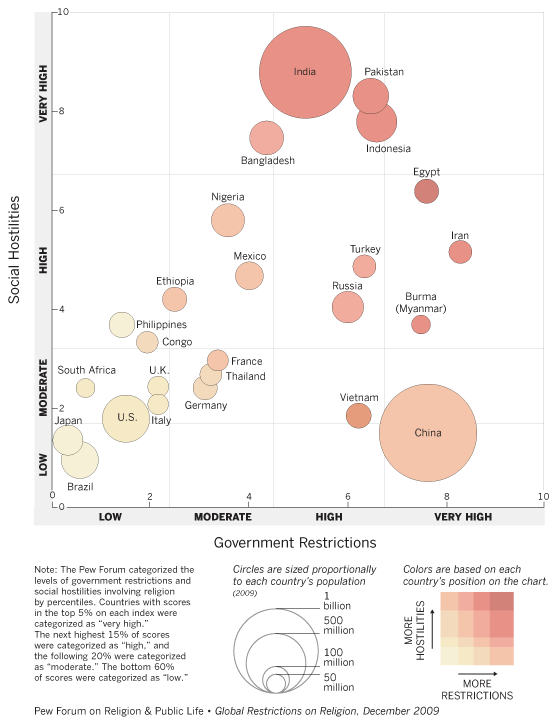The weekly report on the demographics of secularism
by Julie Esris

America is among the LEAST religiously restrictive nations.
This week Indiana Governor Mike Pence passed a ÔÇ£religious freedom restorationÔÇØ law that has generated a great deal of controversy. The law, which nebulously contends that the government cannot ÔÇ£substantially burden a personÔÇÖs exercise of religionÔÇØ, is meant to protect individuals from lawsuits that might infringe on their religious freedom. However, many civil rights groups have criticized the law because it could be used to discriminate against members of the LGBTQ community. This is not an unreasonable fear. We have all occasionally heard of the Christian baker who refuses to make a cake for a same-sex wedding or the Christian florist who will not sell flowers to a same-sex couple. In fact, an Indiana restaurant owner called a radio show and proudly declared that this new law would allow him to refuse to serve gay people because his Christianity forbids homosexuality (how he could possibly know the sexual orientation of everybody entering his restaurant is anybodyÔÇÖs guess).
Of course it is clear that this law, ostensibly protecting religious freedom, in fact legalizes religious discrimination. However, another issue worth considering is the fact that writing this law begs that question that Americans do not have enough religious freedom. In fact, Indiana is not the first state to enact such a lawÔÇöit is the twentieth. Is America really too restrictive on religious freedom as the passing of these laws implies?
A 2009 Pew study answers this question by measuring religious restrictions in 198 countries (99.5% of the worldÔÇÖs population). Some religious restrictions were defined as government policies and laws that inhibited or limited citizensÔÇÖ religious practices, and other religious restrictions the result of hostile actions by individuals and groups. While the poll concludes reports that only 32% of countries have religious restrictions, this number is misleading as these countries contain 70% of the global population. In 75 countries (38%) proselytizing is either limited or restricted entirely. In 178 countries (90%), religious groups have to register with the government. In 117 countries (58%), the required registration often directly results in discrimination against religious minorities. Hostilities between religious groups were reported in 87% of the countries studied. In 126 countries (64%), these hostilities included violence. Religion-inspired terrorism resulted in deaths in 17 countries (9%) studied. Middle Eastern and North African nations were found to be the most oppressive toward religious minorities.
A 2014 Pew poll reveals even more damning information about government-mandated religious persecution in that region of the world. Of 20 largely Islamic North African and Middle Eastern countries, 12 (60%) criminalize apostasy. Depending on the country, the legal consequences for apostasy range from fines to death. Another Pew poll conducted in 2014 concluded that governmental restrictions and hostilities between religious groups in those regions reached a six-year-high.
Which countries were found to be the least restrictive on religion by both governmental and societal accounts? According to the 2009 Pew Poll, Brazil, Japan, Italy, South Africa, the United Kingdom and, of course, The United States. Governor Pence stated that he was open to amending the new religious freedom restoration law, clarifying it so that it cannot be used to discriminate against LGBTQ individuals. But as the 2009 Pew poll illustrated, this law is clearly unnecessary. America has no national religion and citizens are allowed to practiceÔÇöor not practiceÔÇöany religion they wish. There is no penalty for apostasy, and hate crimes against religious groups or individuals are punished.
Perhaps the religious freedom restoration laws should be sent abroad where they are desperately needed.
